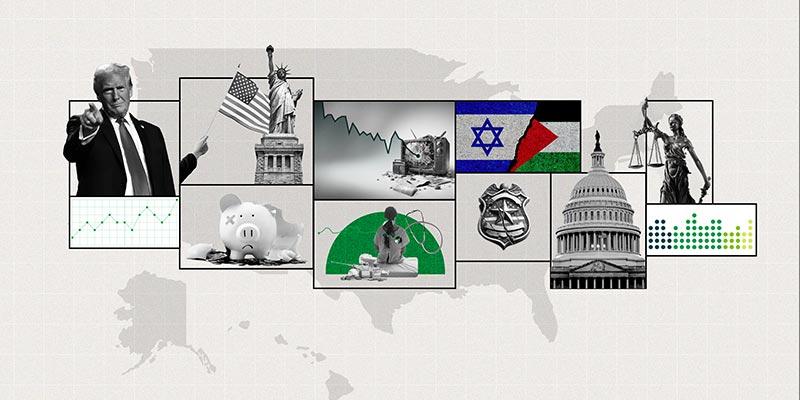GALLUP NEWS SERVICE
PRINCETON, NJ -- The United Nations' public image among Americans turned sharply negative following the organization's failure to authorize the United States' use of military force in Iraq at the onset of the war in 2003. However, despite the souring of U.S. public opinion about the war within a year of the war's launch,��the image of the U.N. remained low throughout 2005 and��has now sunk even further in the past two years.
������'s latest measure of the United Nations' job performance is the lowest ������ has seen since first measuring it in 1953: Only 29% of Americans believe the United Nations is doing a good job of trying to solve the problems it has had to face while 66% say it is doing a poor job. This is statistically similar to the 30% saying it was doing a good job a year ago -- but��is��down from 36% in January 2005. The drop between 2005 and 2006 could be due to the negative publicity surrounding corruption charges against U.N. officials; particularly those involving the son of former U.N. Secretary General Kofi Annan.
Today's record negative perception of the United Nations follows a period from May 2000 to January 2003 when the organization received some of its most positive ratings from the American people -- routinely exceeding 50%.
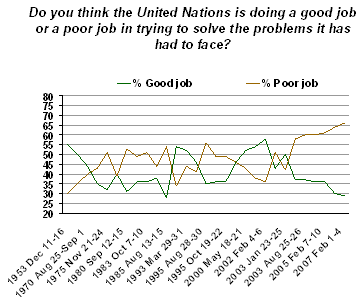
A Significant Role for U.N. Still Favored
The latest U.N. job evaluation comes from ������'s annual World Affairs poll, updated Feb. 1-4, 2007. The same survey asked the public about the role the United Nations should play in world affairs, providing respondents with three options: 1) a leading role where all countries are required to follow U.N. policies, 2) a major role where the U.N. establishes policies, but where individual countries still act separately when they disagree with the U.N, or 3) a minor role with the U.N. serving mostly as a forum for communication between nations, but with no policy-making role.
Most Americans want the United Nations to do more than foster discussion among countries. Close to half want it to have a major policy-making role in world affairs while an additional 29% favor it taking the lead policy role. Only 22% say it should serve a minor policy role serving mostly as a forum for communication.
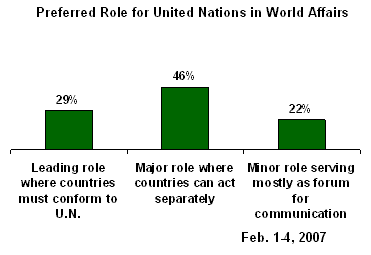
������ has tracked public opinion about the role of the United Nations annually since February 2001. The results have been generally consistent across this period although ������ has recorded a slight shift in favor of increased U.N. authority in world affairs. In 2001, 19% said the United Nations should have the leading role while 29% say this today.
In the past year, the percentage wanting the United Nations to play the leading role rose three percentage points (from 26% to 29%). At the same time, those saying the organization should only play a minor role declined from 28% to 22%.
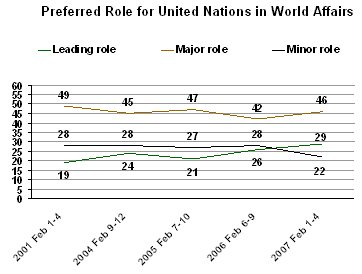
There is little differentiation among demographic and political groups in the United States on this issue. The greatest differences are seen by party and ideology --��but even these differences are only marginal. For instance, 30% of Democrats say the United Nations should play the leading role in world affairs where all countries are required to follow its policies. Just 24% of Republicans say the same.
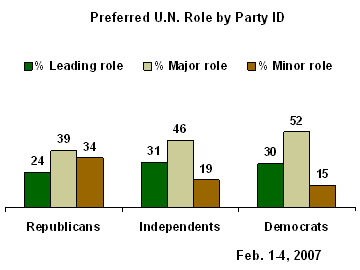
Survey Methods
Results are based on telephone interviews with 1,007 national adults, aged 18 and older, conducted Feb. 1-4, 2007. For results based on the total sample of national adults, one can say with 95% confidence that the maximum margin of sampling error is ±3 percentage points. In addition to sampling error, question wording and practical difficulties in conducting surveys can introduce error or bias into the findings of public opinion polls.23. Do you think the United Nations is doing a good job or a poor job in trying to solve the problems it has had to face?
|
Good job |
Poor job |
No opinion |
|
|
% |
% |
% |
|
|
2007 Feb 1-4 |
29 |
66 |
5 |
|
�� |
�� |
�� |
|
|
2006 Feb 6-9 |
30 |
64 |
7 |
|
2005 Feb 7-10 ^ |
36 |
61 |
3 |
|
2004 Feb 9-12 |
36 |
60 |
4 |
|
2003 Aug 25-26 |
37 |
60 |
3 |
|
2003 Mar 14-15 ^ |
37 |
58 |
5 |
|
2003 Jan 23-25 |
50 |
42 |
8 |
|
2002 Oct 21-22 ^ |
43 |
51 |
6 |
|
2002 Feb 4-6 |
58 |
36 |
6 |
|
2001 Feb 1-4 |
54 |
38 |
8 |
|
2000 May 18-21 |
52 |
43 |
5 |
|
1996 Feb 23-25 |
46 |
46 |
8 |
|
1995 Oct 19-22 |
36 |
49 |
15 |
|
1995 Sep 19-22 |
36 |
49 |
15 |
|
1995 Aug 28-30 |
35 |
56 |
9 |
|
1993 Jun 18-21 |
46 |
41 |
14 |
|
1993 Mar 29-31 |
52 |
44 |
5 |
|
1990 Oct 18-21 |
54 |
34 |
12 |
|
1985 Aug 13-15 |
28 |
54 |
18 |
|
1985 Feb 15-18 |
38 |
44 |
18 |
|
1983 Oct 7-10 |
36 |
51 |
13 |
|
1982 Jun 25-28 |
36 |
49 |
15 |
|
1980 Sep 12-15 |
31 |
53 |
16 |
|
1978 Feb 24-27 |
40 |
39 |
21 |
|
1975 Nov 21-24 |
32 |
51 |
16 |
|
1971 Oct 29-Nov 2 |
35 |
43 |
22 |
|
1970 Aug 25-Sep 1 |
44 |
40 |
16 |
|
1967 Jul 13-18 |
50 |
35 |
16 |
|
1953 Dec 11-16 |
55 |
30 |
15 |
|
^ = Asked of a half sample |
|||
24. Now thinking more specifically, which of the following roles would you like to see the United Nations play in world affairs today -- should it play -- [ROTATED: a leading role where all countries are required to follow U.N. policies, a major role, where the U.N. establishes policies, but where individual countries still act separately when they disagree with the U.N., (or should it play) a minor role, with the U.N. serving mostly as a forum for communication between nations, but with no policy making role]?
|
Leading
|
Major
|
Minor
|
SHOULD
|
OTHER
|
No
|
|
|
% |
% |
% |
% |
% |
�� |
|
|
2007 Feb 1-4 |
29 |
46 |
22 |
* |
* |
2 |
|
�� |
�� |
�� |
�� |
�� |
�� |
|
|
2006 Feb 6-9 |
26 |
42 |
28 |
1 |
1 |
2 |
|
2005 Feb 7-10 |
21 |
47 |
27 |
1 |
1 |
3 |
|
2004 Feb 9-12 |
24 |
45 |
28 |
1 |
* |
2 |
|
2001 Feb 1-4 |
19 |
49 |
28 |
* |
1 |
3 |
|
(vol.) = Volunteered response |
||||||
|
* = Less than 0.5% |
||||||
